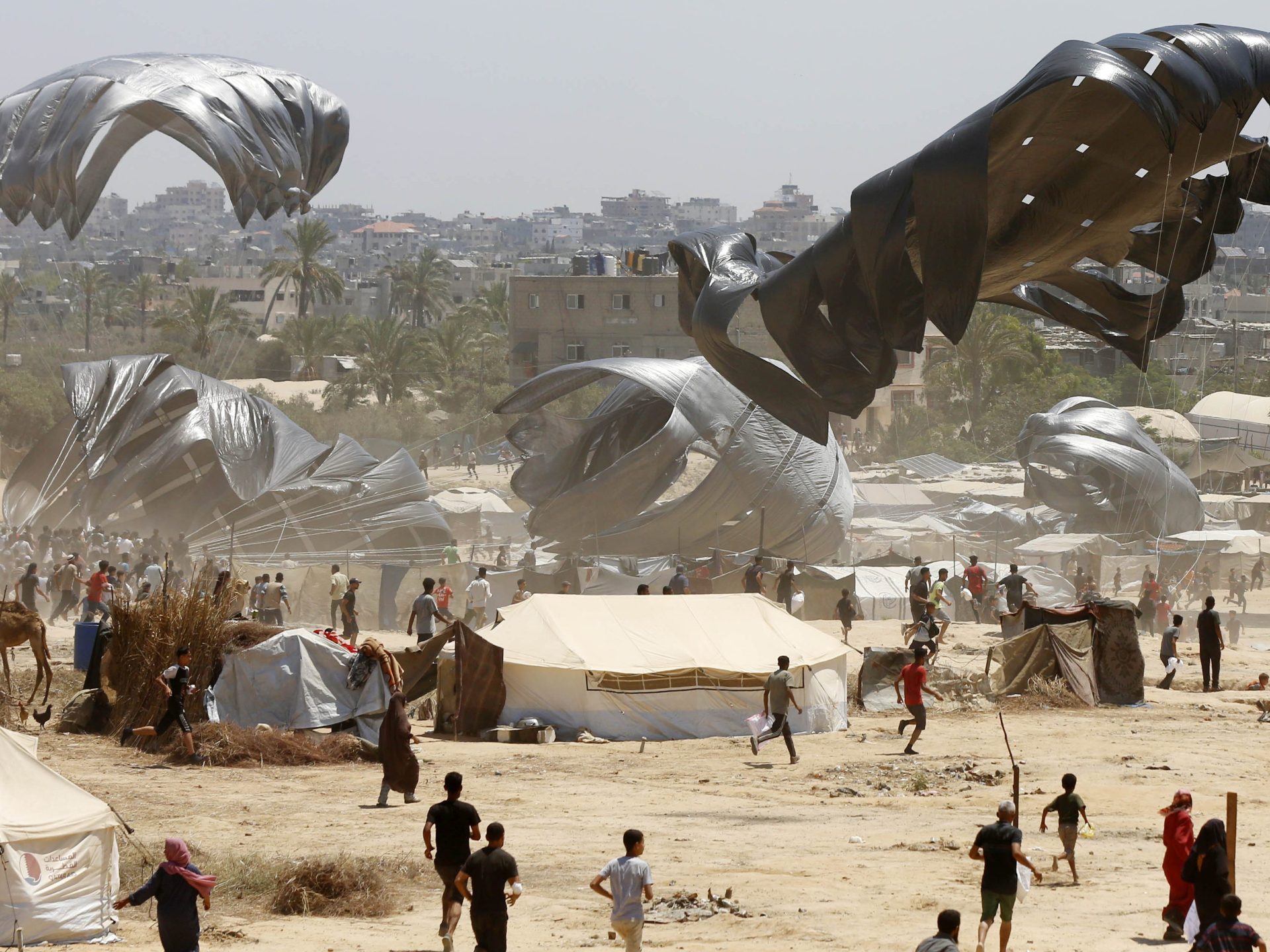Near my central Gaza neighborhood of az-Zawayda last week, aid was dropping from the sky. Because we all knew that a battle would break out when it hit the ground, neither I nor any of my neighbors had the courage to pursue it. The looters wouldn’t be able to get the aid if it flew in the air.
The scene almost always stays the same. When the plane drops the boxes, a gunfire starts to spread. Armed gangs are already armed and prepared to use force to seize control of the area. Who shoots first, who gets there first, also leaves with the food. Those never ever need it the most need it.
In Deir el-Balah’s market in the future, we would find those same “aid boxes” with exorbitant prices on their contents.
My younger brother recently requested a biscuit. I inquired about the cost after purchasing biscuits from an aid package at the market. We could not afford a biscuit, which cost 20 shekels ($5).
The food that is dropped from the sky kills the hungry people as well. Uday al-Quraan, a doctor employed by Al-Aqsa Martyrs Hospital, was killed on Monday when an airdropped pallet hit a tent for the displaced. 11 people were hurt a week ago when another airdrop pallet struck tents in northern Gaza.
In other failed airdrops last year, there were also fatalities. When a group of people rushed to an airdrop location in Gaza City, five people died when their pallet parachute failed to open, and twelve drowned trying to reach boxes that fell into the sea.
Israeli Prime Minister Benjamin Netanyahu called on the entire world to support the process, which led to the concept behind these most recent airdrops. Jordan, the United Arab Emirates, and other European nations are just a few examples of countries that have embraced the idea.
Netanyahu is well aware that the airdrops won’t stop Palestinian hunger, so he requested them rather than allowing UN agencies to distribute aid fairly and orderly, as they have always done.
Although the general public may be misled into believing that something is being done to combat the hunger in Gaza, these airdrops aren’t seen as a genuine solution or a humanitarian gesture. We view them as nothing more than a PR stunt, a means of stifling a crime that hasn’t yet stopped: putting an entire population under siege by preventing thousands of trucks from entering while a few boxes pluck from the sky for the cameras. It all serves as part of a plan to exacerbate the situation and lower Israel’s international pressure.
And so the famine spreads quickly. More than 180 people have died from hunger, including 92 children, according to the Gaza-based Ministry of Health.
Airdrops are perceived as dangerous and ineffective not just in Gaza. Airdropped aid was packaged in the same way as cluster bombs in Afghanistan in 2001. Children who ran after them would mistakenly think they were food boxes. Aid dropped into a besieged area in Syria failed to reach the starving civilians because the area had been either damaged or fell into ISIL’s (ISIS)-held territory.
Airdrops are well known for failing to work, and there is no justification for using them when there are other options. This method is ineffective, according to the UN, and ground delivery is much safer and much better. Four to ten times as much medical supplies can be carried by a truck. Additionally, it is much less expensive. On the Egyptian side of the border, thousands of trucks are waiting to provide food to those who have already been starved.
Yet, Gaza is once more the site of this pointless spectacle. Here, we are aware of the importance of not pity the sky. Food can’t be dropped in the same sky as bombs.
This “humanity with parachutes” is a fig leaf used to try to hide the world’s shame and its choice to passively observe starvation.
Gaza is under the control of bombs, as well as by lies, complicity, soft language, and bloody massacres. A partner in this crime is everyone who keeps silent, justifies, and treats the killer and victim equally.
And Palestinians are witnesses as well, not just victims. We observe countries continuing to arm Israel, trade with it, and provide it with diplomatic cover as the world continues to refuse to act. We see governments use pitiful justifications to avoid imposing embargoes on a country that commits genocide, as required by international law.
And tomorrow, when history is written, it won’t use euphemisms and excuses as a diplomatic language. The names of those responsible for the massacre and starvation of Palestinians will be written in plain letters in the language of facts.
Source: Aljazeera

Leave a Reply